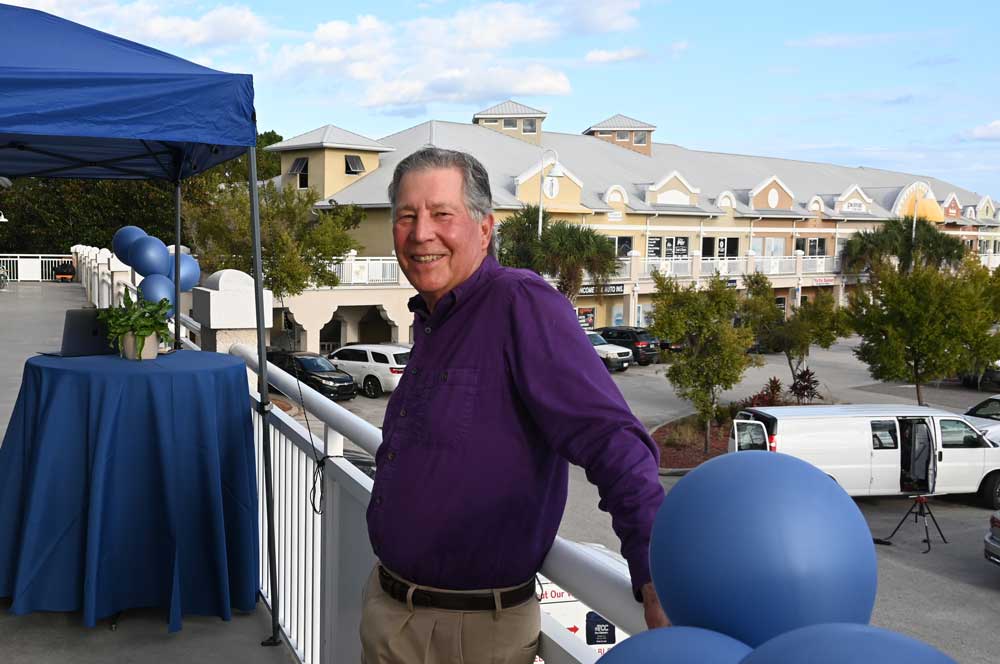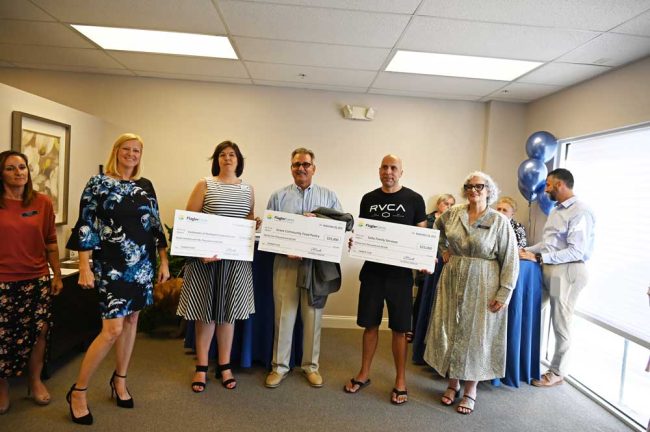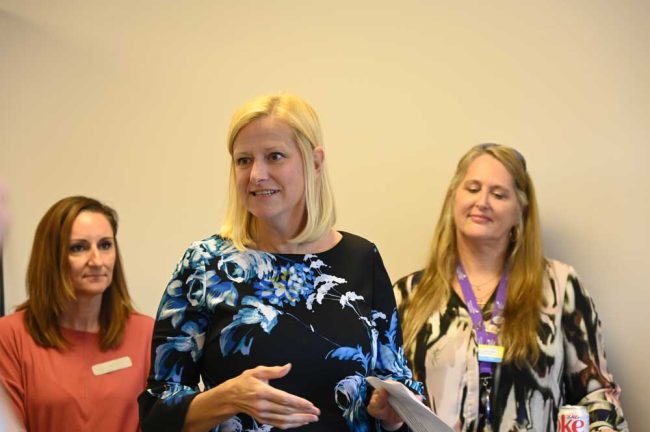
Flagler Cares on Wednesday announced its inaugural “catalyst fund” grants totaling $800,000 to three organizations that will each provide needed social services in Flagler County–for teens suffering from anxiety and depression, for individuals and families recovering from abuse or other forms of dislocation, and for the food-insecure.
The three grants, pegged as the first of many in coming years, are the centerpiece of a $10 million endowment to Flagler Cares, a social service non-profit in Palm Coast, by Dr. Stephen Bickel, who wants to leverage the money into innovative programs targeting underserved areas of the social safety net in Flagler. That’s a long list, and today’s grants are “not the end,” he said. “We have a whole plan of how we can expand. This is a start.” (See: “Doctor’s $1 Million-a-Year Endowment, Largest of Its Kind, Launches Flagler Cares Initiatives for Neediest“.)
The grants were awarded earlier this fall and began taking effect on Oct. 1. Wednesday’s announcement was a more ceremonial occasion, bringing together the recipients, the Flagler Cares community at its Flagler County Village, and elected officials from the Palm Coast City Council, the County Commission and the School Board.
Carrie Baird, CEO of Flagler Cares, described the grants’ purpose as a reflection of her organization’s purpose–“very inspiring, very committed to trying something new, innovative, risk-taking, which so often our sector really does not do.” Baird credited Bickel for changing the trajectory of Flagler Cares from an organization with one part-time employee to 15 today, and a grand vision now getting translated into actual works with direct effect on the neediest.
“We need to think big now because the services that we’re going to need as we grow are going to be big,” Palm Coast Mayor David Alfin said, seeing the initiatives as countering the perception of “little old Flagler.”
The largest grant, $750,000 over three years, rewards innovation. It went to Easterseals Northeast Central Florida, the organization best known for its work with disabled children over the past 75 years. It has a presence in Flagler County through the Flagler County Village, the hub of social service agencies coordinated by Flagler Cares at City Marketplace. The grant will create an entirely new service called the “Me in Progress Wellness Program.”

“We just know that anxiety and depression is on the rise with our kids, with our teenagers,” says Susan B. Moor, Easterseals’ vice president for philanthropy, “and especially those that are high performing, that look normal and are in sports teams, are doing great, but they are not thriving at home, they’re not thriving in their friendships and their relationships, they’re not thriving in their own hearts.”
It’s a different form of disability. The word is being redefined in recent years to also address less visible issues, like anxiety and depression, which can be precursors to suicide attempts. The grant will underwrite a program that will provide teens with a teen-centered “safe space” that combines the vibe of a non-clinical atmosphere (think art, games, music, even kick-boxing) but also in the presence of staffers who work with the teens and their specific treatment plan. It may grow into a full after-school program, or have weekend components. The number of teens involved will be limited by the selection process. It begins with a focus on high-schoolers who will be referred.
The two other grants are for one year, and for $25,000 each.
One went to Salty Family Services, an Ormond Beach-based non-profit looking to expand its services to individuals and families in distress to Flagler.
By way of example, Jeff Chaisson, co-founder of the organization with his wife Frances Chaisson, described how Salty Family Services helped one particular woman. She had moved to Florida to get out of an abusive relationship. She was living on borrowed time on a foreclosed property locally. She was walking the nine blocks to a laundromat to wash clothes when she happened to walk by Salty Church’s own free “laundry love” service. She connected with the Chaissons’ organization.
The woman was mentored for four months, her mentors “empowering her through encouragement,” Chaisson said. Salty Family Services’ networking, a key part of the service, kicked in. Before long, the woman received a donated car. She landed her first job in Flagler. Soon after that the service–which helps with utilities, rent, homelessness–secured enough money to help move her into her first local apartment. That was in 2017. Today, she owns her own cleaning business and employs two people.
“And that story could be replicated. I mean, I know so many stories,” says Colleen Conklin, the school board member who attends Salty Church and watched the service in action firsthand when she was among the Flagler Strong coordinators of the post-Hurricane Irma recovery efforts in Flagler Beach. Floodwaters had driven 400 families out of their homes. “They were one of the first to step up and really connect our families who were homeless,” Conklin said of Salty Services.
“So I think not just with Salty Services, but all of the organizations that were mentioned here today, the theme of it takes a village really is true in many, many ways,” Conklin said. “The need is so tremendous and great that there’s no one entity or organization that is going to meet all those needs. That really takes everyone coming together so there’s not a duplicated effort. And then resources can really be maximized.
In its first year in 2015, Salty Family Services organization raised $9,000 in its first year. After partnering with Salty Church, it’s on pace this year to match or exceed last year’s fund-raising: $400,000, not counting today’s grant. The grant helped employ a part-timer who will extend the services to Flagler on a more permanent basis.
The third organization receiving a grant, also for $25,000, is well known in Flagler: Grace Community Food Pantry, which single-handedly keeps 500 families a week from going hungry with its twice-a-week food distributions. The organization is run by Charles Silano, a pastor. It was the beneficiary of Flagler Broadcasting’s first Food-a-Thon last July, which raised $125,000 for the pantry through the combined efforts of David Ayres, Flagler Broadcasting’s president, and Bickel, who pitched in the $5,000 necessary to enable the station to devote the day of programming to the Food-a-Thon.
Silano’s operation was in great need of a refrigerated food truck. Some of the money from the Food-a-Thon and the $25,000 Flagler Cares grant covered the $64,000 expense.
“It’s made an impact on the labor intensive part of the pantry,” Silano said, “so we’re able to sort better, we’re able to store more food, we’re able to purchase more food, and we’re able to deliver it safely. It’s like having another walk-in cooler. It’s made a tremendous difference. The volunteers absolutely love it because we don’t have to pull everything out of storage.”

The grants aren’t just checks written and dispensed. Flagler Cares remains involved in helping each organization fulfill the grant’s aims, providing its own human capital to keep the goals on track, and accountable.
“We think a lot about strategy, what do we want to do, what kind of organization we need to be to do those things,” Bickel said, and who are the good partners to do the things with. If Flagler Cares doesn’t find those partners to fulfill a needed service, it takes it on itself, as it has with applying telehealth to psychiatric and psychological counseling services.
“There’s a reason I picked Flagler Cares,” Bickel said of his endowment. “It’s because of the great work that they’ve done. If you want to do philanthropy, you want to invest in people to carry your mission out from the beginning, and Carrie has just attracted talented people because of who she is.” He called the results “a testament to Flagler County, the kind of people, talented people we have, really want to make a difference. This is not the end. We’re going to have a whole plan of how we can expand.”





























Leave a Reply